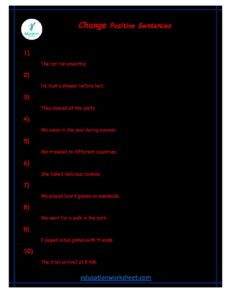change the verbs into Simple Past form positive
Description of Change the verbs into Simple past form positive
The Simple Past tense is a fundamental aspect of English grammar, used to describe actions or events that occurred in the past and have since been completed. One of the key skills in mastering this tense is the ability to change verbs into their Simple Past form, specifically in the positive form. In this comprehensive guide, we will delve into the rules and exceptions for converting verbs into their Simple Past form, focusing on regular and irregular verbs, and providing a variety of examples to aid in understanding. By the end of this guide, you’ll have a firm grasp of how to use verbs in the Simple Past tense to effectively communicate about the past.
1.Understanding the Simple Past Tense
Before we dive into changing verbs into their Simple Past form, it’s important to have a clear understanding of the Simple Past tense itself. This tense is used to talk about actions, events, or situations that occurred and were completed in the past. It is often accompanied by specific time markers such as “yesterday,” “last year,” or “in 1990.” The structure of the Simple Past tense for regular verbs involves adding the “-ed” suffix to the base form of the verb, while irregular verbs have unique past forms that must be memorized.
2.Regular Verbs in Simple Past Form (Positive)
Regular verbs are those that follow a predictable pattern when changing into their Simple Past form. The rule is simple: you add the “-ed” suffix to the base form of the verb.

Example of Change the verbs into simple past form positive
- Verb: Walk
- Simple Past Form: Walked
- Verb: Talk
- Simple Past Form: Talked
- Verb: Play
- Simple Past Form: Played
- Verb: Watch
- Simple Past Form: Watched
- Verb: Call
- Simple Past Form: Called
- Verb: Jump
- Simple Past Form: Jumped
- Verb: Visit
- Simple Past Form: Visited
- Verb: Cook
- Simple Past Form: Cooked
Regular verbs are highly consistent in their transformation to the Simple Past tense, making them relatively easy to work with in everyday language.
Irregular Verbs in Simple Past Form (Positive)
Irregular verbs, on the other hand, do not follow the standard “-ed” pattern when changing into their Simple Past form. Instead, they have unique past forms that need to be memorized. Here are some examples of irregular verbs in their Simple Past form:
- Verb: Go
- Simple Past Form: Went
- Verb: Eat
- Simple Past Form: Ate
- Verb: Have
- Simple Past Form: Had
- Verb: Do
- Simple Past Form: Did
- Verb: Say
- Simple Past Form: Said
- Verb: Swim
- Simple Past Form: Swam
- Verb: Take
- Simple Past Form: Took
- Verb: Drive
- Simple Past Form: Drove
As you can see, these irregular verbs have unique past forms that do not conform to the “-ed” pattern. Learning these forms is essential for accurate use of the Simple Past tense.
Tips for Mastering the Simple Past Tense
- Practice, Practice, Practice: The key to mastering any aspect of language is practice. Regularly using verbs in their Simple Past form in your speech and writing will reinforce your understanding and improve your fluency.
- Use Flashcards: Create flashcards with the base form of verbs on one side and their Simple Past forms on the other. Review these cards regularly to test your knowledge.
- Read and Listen: Reading books, newspapers, and listening to native speakers in movies or podcasts can expose you to a wide range of verbs in their Simple Past form. This helps you internalize the patterns and exceptions.
- Seek Feedback: Don’t be afraid to ask for feedback from teachers, language partners, or native speakers. Constructive criticism can help you identify and correct errors in your usage.
- Keep a Journal: Maintain a journal where you write about your daily activities in the Simple Past tense. This practice can help you apply what you’ve learned in real-life situations.

